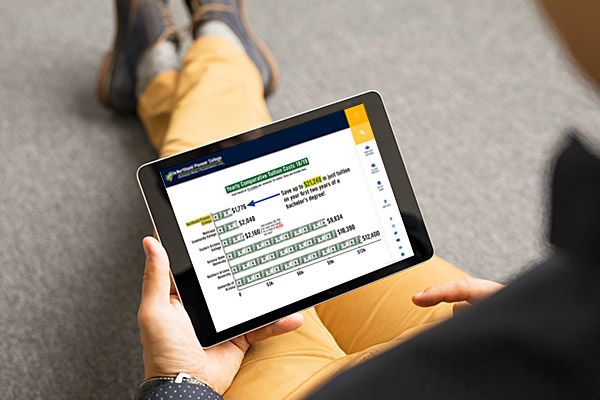|
Section: 2700s - Personnel, General |
Last Review Date: 2/1/2023 |
|
Responsible Area: Human Resources |
Effective Date: 2/1/2023 |
|
Policy/policies the procedure is based on: #1210, #1524, and #1526 |
Revision History: New: 7/1/2021 |
1.0 - SCOPE
All Northland Pioneer College (NPC) Staff
2.0 PURPOSE
To set the standards for positions that have been determined as eligible for formal remote or hybrid work. This procedure can also be utilized as a legitimate solution to solving/mitigating our lack of physical office/workspaces and for recruitment challenges for certain positions.
Beginning with the 2023-2024 contract year, job descriptions for all staff and administrative positions will include one of the following four designations:
- Remote Eligible
- Hybrid Eligible Level 1
- Hybrid Eligible Level 2
- On-Site Required
In certain instances, and under the Americans with Disabilities Act (ADA), the creation of a formal remote/hybrid arrangement, or authorization to work at an alternate work location, may be considered a reasonable accommodation for an employee with a qualifying disability.
3.0 - DEFINITIONS
3.1 Alternate Work Location/Site – A workplace, other than an employee’s Home Base, where official NPC business is performed, which may include an employee’s home, remote location, or another NPC campus or location otherwise identified in the job description.
3.2 Eligible Employee – An individual who is employed in a position determined eligible through the Remote/Hybrid Work Procedure and as identified in the employee’s job description.
3.3 Eligible Position – A position evaluated through the Remote/Hybrid Work procedure and determined to have measurable quantitative or qualitative, results-oriented standards of performance that can be accomplished independently of others, with minimal need for support, and without impacting service quality or organizational operations.
3.4 Home Base –The location where an NPC employee is assigned to work, spends the greatest portion of regular working time, and to which the employee returns on completion of a special assignment. Employees who are on a remote Addendum will be assigned the Painted Desert Campus/District Office as their Home Base. Hybrid employees will be assigned a campus or center as Home Base.
3.5 Hybrid Level 1 Designation– A work arrangement in which an employee is authorized to perform their assigned job duties at an alternate work site for one day per week. The alternate work site must be located in an in-service area. Employees must attend regular in-person meetings as required by their position or as required for participation in shared governance activities.
3.6 Hybrid Level 2 Designation - A work arrangement in which an employee is authorized to perform their assigned job duties at an alternate work site for two or more days per week. The alternate work site must be located in an in-service area. Employees must attend regular in-person meetings as required by their position or as required for participation in shared governance activities.
3.7 In-service area – Navajo and Apache Counties.
3.8 Out-of-service area – Any location outside of Navajo and Apache Counties, which may include out-of-state.
3.9 Remote / Hybrid Addendum: An Addendum to an employee’s contract that will include expectations regarding designations of remote, hybrid level 1, or hybrid level 2. A Remote Addendum template can be found here and kept in the Human Resources Offices.
3.10 Remote Designation - A work arrangement in which an employee is authorized to perform their assigned job duties from an alternate work site 100% of the time. Remote locations may be in the service area or out of the service area. Having a remote designation may affect the ability of an employee to serve on some committees or teams at the college. The college does not guarantee a remote option will be available for all meetings or activities. Remote employees must attend all meetings as outlined in this agreement section 4.9
3.11 Remote Location: Remote locations may be in the service area or out of the service area.
4.0 - PROCEDURE
4.1 Designations and How They are Determined
a) The initial designation for each position was made by the President’s Cabinet member who maintains oversight for the position in consultation with Human Resources and is non-negotiable. The key factors considered focused on service delivery and how to best meet the needs of students and internal clients. Factors included:
- How work is completed
- physical, digital or abstract
- Availability of technology to assist in effective remote work and collaboration
- If in-person services are the only way the customer, student, or client can receive services
- Job responsibilities related to direct student or client (including internal clients) contact or office coverage
- Impact of remote or hybrid work on collaboration within the work team, division, and college.
b) The designation of the position will be reevaluated when they become open or upon the supervisor’s request to their President’s Cabinet representative. The President’s Cabinet representative shall route the request to Human Resources to complete any re-evaluations.
c) Some states are ineligible for remote work due to state requirements for remote workers, which NPC cannot meet. Human Resources maintains the list of states eligible for remote work.
4.2 Remote / Hybrid Contract Addendum
a) At the time of hire, or when an employee is in an eligible remote or hybrid role, if the eligible employee chooses to work remote/hybrid a formal Remote or Hybrid Contract Addendum is executed, (Addendum may be obtained from human resources) so that all the proper taxes, workers compensation, and other considerations can be made.
b) A Remote or Hybrid Contract Addendum documents the critical components of the working relationship between the remote/hybrid worker and the supervisor including the requirement that the employee follows NPC policies and procedures and agrees to the accompanying terms and conditions listed in the Addendum.
c) By signing the Remote or Hybrid Contract Addendum, the employee and supervisor agree to abide by the identified terms and conditions, including that the employee will maintain a safe, designated, and secure remote/hybrid workspace as described herein.
d) The Remote or Hybrid Contract Addendum shall be maintained in the employee’s official personnel file in the Human Resource Office.
e) Remote and Hybrid Employees are subject to the same corrective action and disciplinary procedures as all other employees at NPC.
f) Failure to comply with the Remote or Hybrid Contract Addendum will subject the employee to discipline up to and including termination in accordance with NPC policies and procedures.
g) Any staff member working a remote or hybrid schedule must complete all documentation and follow the proscribed process in this procedure. Supervisors are responsible for ensuring the required documents have been executed, and the documents have been approved before allowing the employee to begin a remote or hybrid schedule.
4.3 Exceptions to a Formal Remote/Hybrid Arrangement
a) An employee who works from their home for less than one (1) day per week or alternates between NPC work sites or other locations designated in their job description to complete their assigned duties is not considered to be a remote/hybrid employee.
b) An employee that may need to work in an alternate location to accommodate unusual circumstances in their primary workplace, such as a brief office closure for renovations or relocation is also not considered to be a remote/hybrid employee. NOTE: in the event of an on-the-job injury, the provisions of Section 4.16 of this procedure (Safety and Liability) will govern the reporting of an on-the-job injury.
4.4 In-Service Area vs Out of Service Area
a) Out-of-service area work is permitted only for jobs categorized as remote.
b) Out-of-service area work outside of the United States is not permitted.
c) A list of out-of-service area employees will be provided to the Business Office for potential Workers’ Compensation claims and Technology Advancement and Support for technical support functions.
4.5 Temporary Travel
Temporary travel (in or out of the service area) approved through travel procedure 2370 will not be considered Remote/Hybrid working and does not require an Addendum. The Employee should ensure their supervisor is aware of the travel in all cases.
If the travel is out of the country, employees are not authorized to travel with NPC equipment without prior authorization from the Chief Information Officer.
4.6 Work Hours/Leave
a) An employee approved for hybrid or remote working and their supervisor will develop a work schedule that complies with procedures governing hours worked.
b) No work-related, in-person meetings involving other employees or students may be held in an employee’s home.
c) A non-exempt employee must record all hours worked each day and work period/work week and must submit completed time records to their supervisor on a timely basis as outlined in the Hybrid Addendum. Non-exempt employees track this through their timecard submissions.
d) A full-time, non-exempt employee participating in remote/hybrid working may not work more than a total of forty (40) hours in a seven (7) day work week/work period without advanced written approval from the respective President’s Cabinet member over the position.
e) A non-exempt employee who works overtime without receiving appropriate approval may lose eligibility to work remotely and may also be subject to disciplinary action.
4.7 Employee’s Compensation
An employee’s compensation and benefits will not be impacted by the election to enter a Remote or Hybrid Contract Addendum.
4.8 Commencement, Convocation, and other Attendance Obligations
a) Remote and Hybrid employees are subject to Procedure 2765, which addresses Commencement and Convocation attendance.
b) Hybrid employees must attend all in-person meetings as assigned by their supervisor or as determined by the chairs of any committee or task force on which they serve.
c) Individual remote/hybrid work schedules may be updated to include additional in-person obligations based on the work required by the position.
4.9 Closure of NPC Locations
If NPC location(s) are closed, due to inclement weather or other emergency, employees who are remote/hybrid working from home on that day will be considered unaffected by conditions that are impacting the primary workplace, and will be expected to perform regular duties, as assigned, if the situation allows. Employees working at alternate worksites (not the employee’s home) due to closure under this section will be subject to the same conditions as other employees at the alternate worksite.
Remote/Hybrid employees that are impacted by significant weather events should work with their supervisor to determine how to complete work and ensure continuity of operations and employment.
4.10 Equipment, Supplies, Materials, and Reimbursable Expenses
a) Employees must use NPC-issued devices when fulfilling their work obligations.
b) Employee may be required to bring NPC computer equipment into an NPC site on occasion to have computer equipment updated or to access specific on-site applications
c) General office supplies (pens, paper, etc.) will be supplied by the employee’s home base and should be obtained during times when in-person work is required.
d) An employee remote/hybrid working from home is expected to use their own furniture, telephone lines, Internet connections, and other office equipment (e.g., a printer). No NPC equipment shall be permanently installed in an employee’s home; however, it is permissible for an employee to utilize a work-issued computer, laptop, or other portable equipment. All NPC equipment must be maintained according to NPC guidelines and must be properly inventoried.
e) Any theft, damage, or malfunction of NPC-issued equipment must be immediately reported to the employee’s supervisor and the Technology Advancement and Support Department.
f) Neither NPC nor any NPC department shall assume responsibility for, or any costs associated with, any improvements made by an employee to their premises or for any operating costs (e.g., electric bills, additional phone lines, internet services, etc.), home maintenance, new or replacement equipment, the cost of maintenance, repair, or operation of personal equipment or any other costs associated with the employee’s use of their home/home office for hybrid purposes. Any such cost should be viewed as a cost offset to the employee’s typical driving commute.
g) Any other expense associated with the employee’s performance of their duties (e.g., certain work-related travel during the business day) and which is appropriate for reimbursement under established NPC procedures, must be submitted to and approved by an employee’s supervisor.
4.11 Child/Dependent/Adult Care and Personal Business
a) Remote/Hybrid work is not intended to serve as a substitute for child or dependent care, nor is it a substitute for the use of paid leave. Remote/Hybrid employees should ensure that appropriate child/dependent care is provided.
b) An employee must refrain from conducting personal business while in work status at their home or alternate work location.
4.12 Workspace
a) The employee will establish an appropriate work environment within his or her home for work purposes.
b) An employee must self-certify the safety of the home workspace.
4.13 Safety and Liability
a) An employee working remotely or hybrid working will be covered by Workers’ Compensation for a job-related injury that occurs in the performance of their duties in the designated workspace or Alternate Work Location.
b) If the employee is working in their home, the injury must have occurred in the workspace designated for that purpose.
c) As soon as possible after an on-the-job injury, the employee, or individual acting on their behalf, should contact the employee’s supervisor and the human resources representative responsible for managing workers’ compensation matters to report the injury. The employee should also contact their Home Base Campus/Center Manager to file an Incident Report.
d) The employee, supervisor, and/or human resources representative should follow the provisions of the college procedure governing Worker’s Compensation – Reporting an Accident to facilitate the treatment of the injury as well as actions to respond to a medical emergency.
e) NPC shall not be liable for an injury suffered by any third party (including members of the employee’s family) at the remote/hybrid working site.
4.14 Security of Work Unit Information and Records
a) A remote or hybrid worker must ensure the security, integrity, and confidentiality of data, documents, records, information, paper files, and access to work unit computer systems to the same degree as when working in their primary home base, and in a manner consistent with NPC procedures governing Risk Assessment and Computer and Electronic Access and Usage. Any use of restricted-access information or materials at an alternative work location must be approved by the employee’s supervisor.
b) A remote or hybrid worker must also comply with all licensing agreements for software owned by NPC.
4.15 Travel
a) Hybrid employees will be assigned a home -base campus or on-site location in their contract and that will be used for all travel following existing travel policies and procedures.
b) Hybrid employees will not be reimbursed for any travel between their alternate work site and any campus or center.
5.0 - Related Authority
- A.R.S. § 15-1444 – General powers and duties of district governing boards
- A.R.S. § 15-1445 – Administrative powers and duties of district governing boards
- NPC Procedure 2737 – Employee Benefits/Workers’ Compensation – Reporting an Accident
- NPC Procedure 2201 - Computer and Electronic Access and Usage
- NPC Procedure 2765 – Personnel Attendance Obligation




